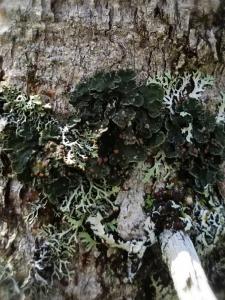Brad Toms's Projects
Nova Scotia Lichens at Risk
Lichen monitoring at MTRI began with the Boreal felt lichen in 2008 and working with industry and government partners to reduce threats to host trees from Cape Breton County to Shelburne County. Since then other lichens have been determined to be at risk by COSEWIC. These include: Vole ears lichen, White-rimmed shingle lichen, Blue felt lichen, Scaly fringe lichen, Eastern waterfan lichen, Frosted glass whiskers lichen, Black foam lichen and Wrinkled shingle lichen. These lichens and others not designated at risk by COSEWIC (Poor mans shingle lichen, Powdered moon lichen, Hibernia Jellyskin lichen) are managed on crown land by the Nova Scotia Special Management Practice (SMP) for lichens. MTRI began long term survivor monitoring for Vole Ears in 2015 and survivorship and threats monitoring for all other at risk lichen species starting in 2021. MTRI is also working with small woodlot owners to identify and preserve lichens on private land.
Read MoreBats
Hibernating bats used to fill the night skies of Nova Scotia, but in 2011 their populations dropped suddenly because of a new fungal disease, white-nose syndrome. Bats are crucial mammals in our native ecosystems and provide many services to our society. Each night they consume massive amounts of insects, pollinate flowers, and spread plant seeds. Since their decline, MTRI has been monitoring, researching and teaching Nova Scotians all about the wonders of bats. We also manage the Nova Scotia Bat Hotline and use this information to identify nesting colonies and work with the private landowners and partners to monitor these sites.
Read MoreMonarch Butterfly
It is a hard to find a more charismatic species than the mighty Monarch Butterfly. Every year this species migrates 5000km+ from its wintering grounds in Mexico to the US and Canada. Sadly, this world traveler is Endangered in Nova Scotia, and their population is declining. Many factors are behind this but the most significant are the widespread use of pesticides and the loss of their habitat. MTRI is a leader in Monarch engagement with the public; we organize the provincial milkweed monitoring project, teach schoolchildren about this and other native pollinators and supply nurseries with seeds to grow their host plant, Milkweed. For more information on how you can get involved or to report sightings, contact monarchs@merseytobeatic.ca.
Become a part of the milkweed monitoring project! Click on the following link for the training module and find all the materials you need to complete milkweed surveys: Survey Materials
Join the iNaturalist project to monitor Monarchs in Nova Scotia: https://www.inaturalist.org/projects/nova-scotia-monarch-monitoring
Read More


